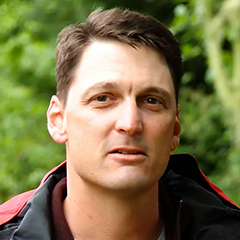
Photographing Wild Turkeys: Preparation Techniques
Doug GardnerWhen you think of wild turkeys, you probably associate them with the Pilgrims and the Native Americans from that very first Thanksgiving. Wild turkeys go back a long way. In this video, professional wildlife photographer Doug Gardner shows you setup and planning techniques for photographing wild turkeys in nature.
Although the four wild turkey species are found in most states, Doug sets up to photograph the eastern wild turkey in the Southeast. For bird locations, he suggests talking to local farmers and conservation officers. Early spring is the ideal time for photographing wild turkeys when they roam open woods and crop fields, and they are responsive to calls and decoys. Doug shows you how to scout the birds and how to set up a blind.
On location two days prior to photography, Doug uses binoculars to scout wild turkey habitats at sunrise and sunset. He is looking for areas where the birds roost. For the ideal blind location for photographing wild turkeys, you should find a vantage point where you can see the entire field. There should be thick background cover so you blend into the surroundings. Doug shows you how to build a natural blind out of the vegetation. The birds might scatter if they spot an artificial blind.
To build your blind, first clear away the natural debris that might cause movement noise. Next, trim some thick green branches. Then, lay down a piece of camouflage and stick the branches around the camouflage blind. Finally, make sure to check for obstructions that hinder your field of view.
You should complete these blind preparations the night before your shoot. Before you return in the morning, adjust your camera settings and set out the lenses you think will work best. Remember: in photographing wild turkeys, half the battle involves planning and preparation. The rest is up to you.
See all videos in our Techniques for Photographing Eastern Wild Turkeys Course:
- Techniques for Photographing Eastern Wild Turkeys—Course Preview
- Photographing Wild Turkeys: Preparation Techniques
- Capturing Images of Wild Turkeys
- Photographing Eastern Wild Turkeys in the Afternoon

